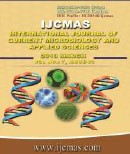


 National Academy of Agricultural Sciences (NAAS)
National Academy of Agricultural Sciences (NAAS)

|
PRINT ISSN : 2319-7692
Online ISSN : 2319-7706 Issues : 12 per year Publisher : Excellent Publishers Email : editorijcmas@gmail.com / submit@ijcmas.com Editor-in-chief: Dr.M.Prakash Index Copernicus ICV 2018: 95.39 NAAS RATING 2020: 5.38 |
Fifty five okra genotypes (ten lines, four testers, forty hybrids and one check) okra accessions were tested for stability in three different environments between 2014-15 using Additive main effect and multiplicative interaction (AMMI) and Genotype main effect and Genotype by Environment (GGE) models. The experiment was laid out in a Randomized Complete Block Design (RCBD) with three replications. The mean squares due to genotypes were highly significant for all the traits when tested against pooled error and pooled deviation which indicated the presence of considerable genetic variability in the materials. Highly significant differences were also observed amongst environments for all the traits when tested against pooled error and pooled deviation which indicated the presence of considerable environmental differences for all the traits. The genotypes x environment interactions were significant for all the traits except fruit length when tested against pooled error. Both AMMI and GGE biplots identified most stable, high yielding genotypes that were overall best in performance in relation to yield and stability. Result of stability estimates of 55 genotypes revealed that none of the genotype was stable for all the traits studied. Further, IC – 045796 x GAO – 5 and VIO 47672 x GAO – 5 were the most stable hybrids in terms of fruit yield and its components. For the trait, fruit yield per plant Environment E3 (winter season) was found to be the most unfavourable while Environment E2 (rainy season) was the most favourable environment.
 |
 |
 |
 |
 |